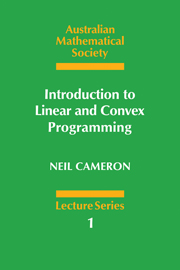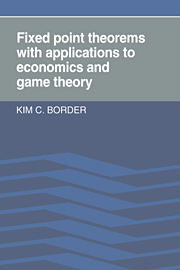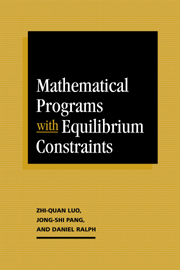Methods of Mathematical Economics
Many advances have taken place in the field of combinatorial algorithms since Methods of Mathematical Economics first appeared two decades ago. Despite these advances and the development of new computing methods, several basic theories and methods remain important today for understanding mathematical programming and fixed-point theorems. In this easy-to-read classic, readers learn Wolfe's method, which remains useful for quadratic programming, and the Kuhn-Tucker theory, which underlies quadratic programming and most other nonlinear programming methods. In addition, the author presents multiobjective linear programming, which is being applied in environmental engineering and the social sciences. The book presents many useful applications to other branches of mathematics and to economics, and it contains many exercises and examples. The advanced mathematical results are proved clearly and completely.
Product details
January 2003Paperback
9780898715095
315 pages
227 × 154 × 16 mm
0.439kg
This item is not supplied by Cambridge University Press in your region. Please contact Soc for Industrial & Applied Mathematics for availability.
Table of Contents
- Preface to the Classics Edition
- Preface
- Errata
- 1. Linear Programming. Introduction to Linear Programming
- Linear Programs and Their Duals
- How the Dual Indicates Optimality
- Basic Solutions
- The Idea of the Simplex Methods
- Separating Planes for Convex Sets
- Finite Cones and the Farkas Alternative
- The Duality Principle
- Perturbations and Parametric Programming
- The Simplex Tableau Algorithm
- The Revised Simplex Algorithm
- A Simplex Algorithm for Degenerate Problems
- Multiobjective Linear Programming
- Zero-Sum, Two-Person Games
- Integer Programming. Gomory's Method
- Network Flows
- Assignment and Shortest-Route Problems
- The Transportation Problem
- 2. Nonlinear Programming. Wolfe's Method for Quadratic Programming
- Kuhn-Tucker Theory
- Geometric Programming
- 3. Fixed-Point Theorems. Introduction to Fixed Points
- Contraction Mappings
- Garsia's Proof of the Brouwer Fixed-Point Theorem
- Milnor's Proof of the Brouwer Fixed-Point Theorem
- Barycentric Coordinates, Sperner's Lemma, and an Elementary Proof of the Brouwer Fixed-Point Theorem
- The Schauder Fixed-Point Theorem
- Kakutani's Fixed-Point Theorem and Nash's Theorem for n-Person Games
- Index.






